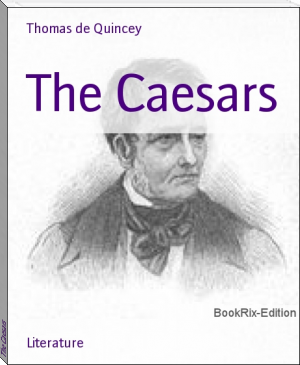The Caesars by Thomas de Quincey (english love story books TXT) 📖

- Author: Thomas de Quincey
Book online «The Caesars by Thomas de Quincey (english love story books TXT) 📖». Author Thomas de Quincey
But, in a fuller and ampler sense, recurring to what we have said of Dioclesian and the tenor of his great revolutions, we may affirm that Probus and Carus were the final representatives of the majesty of Rome: for they reigned over the whole empire, not yet incapable of sustaining its own unity; and in them were still preserved, not yet obliterated by oriental effeminacy, those majestic features which reflected republican consuls, and, through them, the senate and people of Rome. That, which had offended Dioclesian in the condition of the Roman emperors, was the grandest feature of their dignity. It is true that the peril of the office had become intolerable; each Caesar submitted to his sad inauguration with a certainty, liable even to hardly any disguise from the delusions of youthful hope, that for him, within the boundless empire which he governed, there was no coast of safety, no shelter from the storm, no retreat, except the grave, from the dagger of the assassin. Gibbon has described the hopeless condition of one who should attempt to fly from the wrath of the almost omnipresent emperor. But this dire impossibility of escape was in the end dreadfully retaliated upon the emperor; persecutors and traitors were found every where: and the vindictive or the ambitious subject found himself as omnipresent as the jealous or the offended emperor. The crown of the Caesars was therefore a crown of thorns; and it must be admitted, that never in this world have rank and power been purchased at so awful a cost in tranquillity and peace of mind. The steps of Caesar's throne were absolutely saturated with the blood of those who had possessed it: and so inexorable was that murderous fate which overhung that gloomy eminence, that at length it demanded the spirit of martyrdom in him who ventured to ascend it. In these circumstances, some change was imperatively demanded. Human nature was no longer equal to the terrors which it was summoned to face. But the changes of Dioclesian transmuted that golden sceptre into a base oriental alloy. They left nothing behind of what had so much challenged the veneration of man: for it was in the union of republican simplicity with the irresponsibility of illimitable power, it was in the antagonism between the merely human and approachable condition of Caesar as a man, and his divine supremacy as a potentate and king of kings--that the secret lay of his unrivalled grandeur. This perished utterly under the reforming hands of Dioclesian. Caesar only it was that could be permitted to extinguish Caesar: and a Roman imperator it was who, by remodelling, did in effect abolish, by exorcising from its foul terrors, did in effect disenchant of its sanctity, that imperatorial dignity, which having once perished, could have no second existence, and which was undoubtedly the sublimest incarnation of power, and a monument the mightiest of greatness built by human hands, which upon this planet has been suffered to appear.
Imprint
Publication Date: 11-27-2009
All Rights Reserved
 Have you ever thought about what fiction is? Probably, such a question may seem surprising: and so everything is clear. Every person throughout his life has to repeatedly create the works he needs for specific purposes - statements, autobiographies, dictations - using not gypsum or clay, not musical notes, not paints, but just a word. At the same time, almost every person will be very surprised if he is told that he thereby created a work of fiction, which is very different from visual art, music and sculpture making. However, everyone understands that a student's essay or dictation is fundamentally different from novels, short stories, news that are created by professional writers. In the works of professionals there is the most important difference - excogitation. But, oddly enough, in a school literature course, you don’t realize the full power of fiction. So using our website in your free time discover fiction for yourself.
Have you ever thought about what fiction is? Probably, such a question may seem surprising: and so everything is clear. Every person throughout his life has to repeatedly create the works he needs for specific purposes - statements, autobiographies, dictations - using not gypsum or clay, not musical notes, not paints, but just a word. At the same time, almost every person will be very surprised if he is told that he thereby created a work of fiction, which is very different from visual art, music and sculpture making. However, everyone understands that a student's essay or dictation is fundamentally different from novels, short stories, news that are created by professional writers. In the works of professionals there is the most important difference - excogitation. But, oddly enough, in a school literature course, you don’t realize the full power of fiction. So using our website in your free time discover fiction for yourself. 




Comments (0)